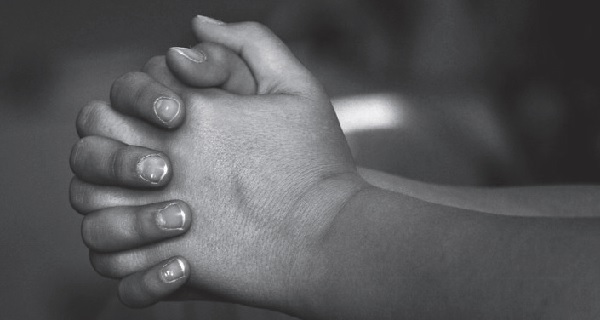Fruitful Vines and Corner Pillars:
A Countercultural Charge for Men and Women
By Dr. Mike Ross

Sometimes when I think about the type of people God calls us to be to glorify him and serve those around us, I think of a little verse in Psalm 144.
Psalm 144 is an interesting psalm. It’s a warrior psalm written by a king, King David. First, he thanks God for his military victories that preserved the nation of Israel, God's people that he was committed to, the Old Testament church. David also thanks the Lord for his salvation, that he has rescued him. Then, David prays a lovely prayer that begins in verse 12. This is what he says:
May our sons in their youth be like plants full grown, our daughters like corner pillars cut for the structure of a palace. May our granaries be full, providing all kinds of produce; may our sheep bring forth thousands and ten thousands in our fields; may our cattle be heavy with young, suffering no mishap or failure in bearing; may there be no cry of distress in our streets! Blessed are the people to whom such blessings fall! Blessed are the people whose God is the LORD! (Psalm 144:12-15)
In examining this prayer for blessing, we find that David gives us a four-fold description of what a blessed country looks like. It has a great economy. It also has a low crime rate—it’s safe to go out in the streets, and no one is crying out in the streets about violence or injustice. Furthermore, a blessed country is a place where agriculture prospers. It has plenty of food, plenty of grain, and the livestock are healthy and happy. Most importantly, though, the capstone of this great society is its sons and daughters. By experience, I've found that what the scripture says about them can actually be quite controversial.
I'm a preacher, and preachers have what we call a three-chance rule. Here’s what I mean. If you preach a sermon for the first time and people get upset by it, no big deal. If you preach it somewhere else a second time and the audience again gets upset, it may be a good idea to reexamine your premise or approach. If you’re preaching a third time, however, and the third group gets upset, it may be a good idea to find a different way to make your point and not keep the sermon in your regular arsenal.

I've preached from Psalm 144's insights about sons and daughters three times now. The first two times did not go well. The first time I shared from it was at a Christian college about three years ago. What I had to say upset the faculty and the students so much that they demanded a retraction from me. I didn’t give them that, but I did write an e-mail apologizing to the community for any offense I had given. Last year, I brought up the topic again in a seminary class I was teaching, and the seminary students also got upset about what I said. That time, though, I at least had the forum a classroom provides to work it through with them. The third time I shared it seemed to go better, but as I started, I joked with my audience that if they got upset by it, I’d ask them to bow for prayer so I could run for the back door before they lifted their heads!
All that to say, I honestly don’t think what Psalm 144 has to say is that offensive. I just think it’s contrary to the way we think and live, at least in America. In the Hebrew, verse 12 more literally reads, “May our sons in their youth be like vines that are full grown, our daughters like corner pillars cut for the structure of a temple.” David beseeches God for this because young men and young women who have these characteristics bless a nation.
David asks that the young men be like fruitful vines. To me a vine is kind of an odd description to describe a man, but that is what the Holy Spirit inspired David to say. A vine exists for one purpose, and only one purpose: that it might grow to maturity so its life juices, its sap, can produce fruit that remains. The vine exists for the purpose of the fruit. I do not think it coincidental that later on Jesus Christ, probably using this text as the basis for his metaphor, said “I am the vine, and you are the branches. Without me you can do nothing, but if you abide in me, you will bring forth much fruit. For you have not chosen me, but I chose you, that you should go and bear fruit and your fruit should remain” (see John 5:5, 16).
A mature vine is a picture of a young man who leads a sacrificial life. He does not live for himself. He lives for those who are going to benefit from his life. Certainly those people include his wife, his children, and future grandchildren, but it also can include the members of the church he attends, his community, his country, the company he works for, or the military branch in which he serves. The definition of godly manhood is to be like Christ, “that we no longer live for ourselves,” as Paul says, “but for him who died and rose again on our behalf ” (2 Cor. 5:15). A godly man will live to serve other people—and ultimately the Lord.
No one has reacted strongly when I've shared that. What David wanted when he asked that Israel's daughters “be like corner pillars cut for the structure of a palace or a temple” has proven to be the controversial part. In the ancient world, in the Greco-Roman, Hebrew, and Egyptian cultures, virtue was always presented in female form. Often, they were depicted in statue form on the four corners of a temple. In fact, the Greeks considered four virtues—temperance or self-control, fortitude or courage, justice, and wisdom or prudence—to be goddesses, and they called these virtues “cardinal.” That word came from a root word that means “hinge,” suggesting that they believed society hinged upon these virtues. If you go, for example, to Athens, you’ll find these four virtues depicted as females on the four corners of a palace or a palace of a god, otherwise known as a temple.
Virtues were personified as women because, in the ancient mind, women guarded the virtue of hearth, home, and sacred space. They believed that the more virtuous the women were, the better society was.
I have found this insight to be controversial because, if you and I were writing that verse, we would probably ask for the men what David asks for the women, and vice-versa.
We would say that what would bless a society is virtuous men—and that’s true. We would also say that it's important to have women who are fruitful vines. After all, their wombs bring new life, and the constant, sacrificial giving of themselves nourishes their children and the people around them.
I find it interesting, though, that the Holy Spirit takes those two pictures and reverses them. I don’t want to make more out of this than I should, though. Please hear me— God definitely thinks that women should be sacrificial in the way they live and that men should be virtuous. Furthermore, I don't think he's suggesting that women need to have a higher virtue than men, or that good men will have a lower virtue than women. But through this verse I think he is saying that we, as believers, need to pray for and seek to live out what is counterintuitive to our culture.
I doubt that most people would say that men in America are anything less than selfish. Most men today certainly do not seem willing to lay down their lives for the benefit of someone else and put themselves last. Also—and this is where the offense can come—I think people would increasingly say that women have lost their virtue, that they are as immoral, profane, and irreverent as their boyfriends and husbands. Many people today, especially women, would say, "Why is that a big deal? Women should be able to do anything a man can do and use their bodies however they want without being looked down on." My reply to that would be, though, "Why would you want to? Why would you want to live like that?"

I believe what David prays is under the inspiration of the Holy Spirit. In other words, I really don’t think these are only David’s ideas. Ultimately, I think they are God’s, and it would be wise to hear and take to heart what he says and pray accordingly.
I dream for, and am laboring with the Lord and others to develop, a wonderful counter-culture to the world that my grandchildren will grow up in. I have six grandchildren, four little girls and two little boys. Just as when my children were born, when my grandchildren came into the world, I prayed two things for them. First, I prayed for their salvation. Next, I prayed for their spouse. I still pray those two things for them to this day. I want my granddaughters to marry self-sacrificial men, and I want my grandsons to marry women that are virtuous in every way. I'm not expecting them to have been perfect, but I am saying that, just as my four children did, I want my grandkids to marry better Christians than they are.
And that's the point—our families, churches, and nation will flourish when people become like Christ. The temptation in our day is just the same as it has always been. Men are tempted to live for themselves, and the women are tempted to sacrifice their virtue to win these selfish men. Through David, God says a nation is blessed when that script gets flipped on its head, when self-sacrificial, virtuous men and virtuous, self-sacrificial women work together to sustain their families, God's temple, the church, and the life of the nation. Such men and women give their lives away, like Christ does. For Christ is obviously the perfect virtuous man, and he is the vine that sustains us all.


 Dr. Mike Ross is the Senior Pastor of Christ Covenant Church in Matthews, NC. He has pastored in the PCA since 1982. Reverend Ross travels annually overseas on preaching and teaching missions and has authored two books, Preaching For Revitalization and The Light of the Psalms: Deepening Your Faith with Every Psalm, both by Christian Focus Publishers. Mike and his wife Jane have four children and six grandchildren.
Dr. Mike Ross is the Senior Pastor of Christ Covenant Church in Matthews, NC. He has pastored in the PCA since 1982. Reverend Ross travels annually overseas on preaching and teaching missions and has authored two books, Preaching For Revitalization and The Light of the Psalms: Deepening Your Faith with Every Psalm, both by Christian Focus Publishers. Mike and his wife Jane have four children and six grandchildren.